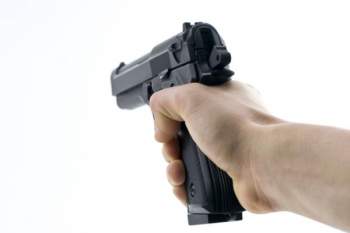
Indiana Gun Laws

State of Indiana proves to be one amongst the many states that have very few restrictions regarding firearms. The only real prohibition is in regards to the carrying of handguns. All firearms are not subject to any form of Indiana licensing, and the registration of guns or their owners is not necessary under Indiana law.
The purchasing of firearms is granted to those over the age of eighteen. The only exception instituted is if a minor with the proper consent by a parent or guardian wishes to purchase a firearm. It is illegal under Indian law to allow for the selling or purchasing of a firearm to a convicted felon, or an individual that is deemed to be addicted to drugs or alcohol. Those that are not mentally proficient to handle a firearm are also prohibited from purchasing firearms.
While rifles and shotguns are loosely regulated by Indiana law, there are more specific regulations regarding the purchasing and selling of handguns. The transfer of a handgun is subject to a background check to be conducted by an authorized dealer at the time of purchase. Indiana law provides for law enforcement officials and individuals with a valid concealed carry license to exempt from the instant background check.
Indiana licensing is not required for the possession of firearms, whether it be a rifle, shotgun, or handgun. However, there are certain regulations that exist imposed by Indiana law regarding the possession of firearms by a minor:
A minor may be in possession of a firearm while attending a hunting course or firearms safety class, while under the supervision of a qualified or certified instructor.
If the minor is engaged in target shooting at an authorized location under the supervision of a qualified person, it is legal under Indiana law.
If the minor is engaged in the practice of hunting or trapping with the appropriate license, then possession is permitted.
If the minor is on the premises of his/her home, with the permission of a parent or guardian.
If the minor is on property that is owned or controlled by the parent or guardian, then possession is lawful.
Possession on school property, or property used by the school is considered illegal by Indiana law. The exception to this provision is in regards to the transportation of a firearm by a qualified or eligible person.
The carrying of a handgun is the only circumstance that requires Indiana licensing. Indiana licensing to carry a handgun is subject to an application that must be made to the chief law enforcement officer of the appropriate county or municipality in which the applicant resides, or has his current employment. The application is to contain certain information in regards to the applicant, such as:
Name and Address
Occupation
Age, Race, and Nationality
Criminal record, if any
Height and Weight
Reason for applying for Indiana licensing permitting to carry a handgun
The appropriate law enforcement official will also conduct an investigation regarding the applicants social and moral standing, so as to provide for verification contained in the application. This information, as long as a set of fingerprints, will be forwarded to the Indiana State Police Superintendent, which will conduct any further investigations as deemed necessary. If the Superintendent can not find any legitimate reason to deny for Indiana licensing to carry a handgun, then the license will be granted.
The license will remain valid for four years from date it was issued. An option for an unlimited license is also available, which is valid for the entire lifetime of the applicant. Certain provisions are considered in the decision to provide for a restricted or unlimited license. A four year license is granted to those that engage in hunting and target practice on a continuous basis. Those qualified for unlimited Indiana licensing must provide for adequate proof, such as protection of life and/or property. The carrying of handguns under Indiana law is subject to eligibility requirements, which are:
At least 18 years of age, and not been convicted of a crime that can be punishable by law for over one year imprisonment.
The applicant is not addicted to drugs or alcohol.
The applicant has exhibited not to have a propensity for violent behavior.
The applicant has not provided for any false or untruthful information in the application itself.
There are no convictions regarding violations of Indiana law dealing with firearms within five years of the application date.
In certain instances, convictions regarding certain crimes may not be necessary to deny a license. Those that have been arrested for felony charges, even if not convicted, may be denied Indiana licensing under the provision regarding outstanding reputation and propensity for violence. If the application is approved, the license will be issued within sixty days of the application date. Certain application fees apply, that are separated by local and state impositions. An example would be a four-year unlimited license is ten dollars for local, and thirty dollars for the state.
Indian law provides for specific provisions regarding firearms for the state. For example, students found in possession of a firearm on school property will be expelled, and the transportation of a firearm in an off-road vehicle or snowmobile is restricted to having the weapon unloaded, securely stored in a case, with a trigger lock implemented.
NEXT: Iowa Gun Laws





















